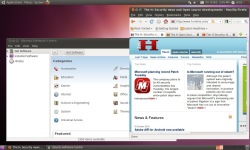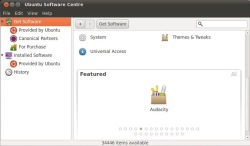Canonical releases Ubuntu 10.10 "Maverick Meerkat"
![]() Canonical and the Ubuntu developers have announced the arrival of version 10.10 of their popular Ubuntu Linux distribution, code named "Maverick Meerkat". Ubuntu 10.10 is the first standard release to be issued following the latest Long Term Support (LTS) edition of Ubuntu, 10.04 LTS, and includes an updated look and feel, a new installer and improved hardware support.
Canonical and the Ubuntu developers have announced the arrival of version 10.10 of their popular Ubuntu Linux distribution, code named "Maverick Meerkat". Ubuntu 10.10 is the first standard release to be issued following the latest Long Term Support (LTS) edition of Ubuntu, 10.04 LTS, and includes an updated look and feel, a new installer and improved hardware support.
Ubuntu 10.10 is based on the 2.6.35 Linux kernel and features version 2.32.0 of the GNOME desktop environment. Existing Ubuntu users installing Ubuntu 10.10 from scratch will notice a new, simplified installer that makes it even easier to install the distribution. Support for installing to the Btrfs file system when manually partitioning is available, but does require that /boot is set up with a different file system. The specially created Ubuntu Font has been included in this release as the default interface font and the "Software Center", which now offers users "Featured" and "What's new" categories and a history of what software has been installed or removed, now includes applications that are for sale.
10.10 sees Shotwell – version 0.7.2 – replacing F-Spot as the default image application and includes version 2.30.2 of the Evolution mail client, which operates much faster than the version included with the previous Ubuntu release. Gwibber has been updated to work with Twitter's new "OAuth-only" authentication system. Various package updates include the current version of the Brasero disc burning application, Firefox 3.6.10, version 2.04 of the Transmission BitTorrent peer-to-peer file sharing client and the latest 3.2.1 release of the OpenOffice.org office suite.

![]() The default Ubuntu 10.10 desktop.
As with the previous version of the OS, Canonical has also focused on the cloud. For the desktop version this takes the form of Ubuntu One's "personal cloud service", which now has interoperability with Android phones, iPhones and Microsoft's Windows. Ubuntu One is free for up to 2GB of storage with extra storage and mobile access as chargeable extras. The 10.10 release sees the arrival of the new Unity interface on the Ubuntu Netbook Edition which has been tuned for smaller screens, mobility and support for touch and gesture input. A short video demonstrating the Ubuntu Unity Desktop is available on YouTube.
The default Ubuntu 10.10 desktop.
As with the previous version of the OS, Canonical has also focused on the cloud. For the desktop version this takes the form of Ubuntu One's "personal cloud service", which now has interoperability with Android phones, iPhones and Microsoft's Windows. Ubuntu One is free for up to 2GB of storage with extra storage and mobile access as chargeable extras. The 10.10 release sees the arrival of the new Unity interface on the Ubuntu Netbook Edition which has been tuned for smaller screens, mobility and support for touch and gesture input. A short video demonstrating the Ubuntu Unity Desktop is available on YouTube.
The distribution also includes a number of cloud deployment enhancements to the server edition of 10.10. Alongside the upgraded Linux kernel are more boot time configuration options and the ability to run AMI (Amazon Machine Images) in a local KVM-virtualised machine. This allows users to configure and test Ubuntu instances before they are sent into Amazon's chargeable cloud. Another deployment enhancement is an improved version of "CloudInit" which lets users of Ubuntu on the cloud set default locales, hostnames, SSH keys and mount points and configure custom commands and scripts to run at start-up or on reboot. Canonical have also announced a "one hour test drive" for users who want to try an Ubuntu 10.10 server running on Amazon's EC2 (Elastic Compute Cloud).

![]() The Ubuntu Software Centre now includes For Purchase software.
Ubuntu Enterprise Cloud, part of Ubuntu 10.10, adds virtio support, a new interface for administrators and the ability to run UEC from a USB stick. UEC is based on Eucalyptus, updated in 10.10 to version 2.0 and GlusterFS and Ceph have been integrated to provide the foundations of what Canonical hopes will be many cloud-focused enterprise scale applications.
The Ubuntu Software Centre now includes For Purchase software.
Ubuntu Enterprise Cloud, part of Ubuntu 10.10, adds virtio support, a new interface for administrators and the ability to run UEC from a USB stick. UEC is based on Eucalyptus, updated in 10.10 to version 2.0 and GlusterFS and Ceph have been integrated to provide the foundations of what Canonical hopes will be many cloud-focused enterprise scale applications.
More details about the release, including a list of known issues, can be found in the official release announcement, release notes and on the Technical Overview wiki page. Ubuntu 10.10 is available to download as ISO images for 32 bit and 64 bit desktops and servers and a separate netbooks installation image. Users currently running Ubuntu 10.04 LTS on a desktop system can upgrade by pressing Alt+F2 and typing "update-manager -d" (without the quotes) into the command box. Users running versions of Ubuntu that are earlier than 10.04LTS will need to upgrade to 10.04LTS first. The next major release following Ubuntu 10.10 will be 11.04 "Natty Narwhal", scheduled to arrive in April of 2011.
See also:
- Ubuntu 9.04 approaches end of life, a report from The H.
- Ubuntu announces application review process, a report from The H.
- Ubuntu 11.04 Developer Summit announced, a report from The H.
(crve)



![Kernel Log: Coming in 3.10 (Part 3) [--] Infrastructure](/imgs/43/1/0/4/2/6/7/2/comingin310_4_kicker-4977194bfb0de0d7.png)

![Kernel Log: Coming in 3.10 (Part 3) [--] Infrastructure](/imgs/43/1/0/4/2/3/2/3/comingin310_3_kicker-151cd7b9e9660f05.png)
















